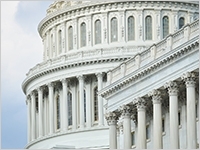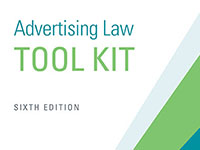|
Venable Joins GALA Venable is pleased to announce that it has been accepted as a member of GALA (Global Advertising Lawyers Alliance). GALA is an alliance of lawyers located throughout the world with particular expertise and experience in advertising, marketing, and promotion law. Firms participating in GALA represent nearly 100 countries, ranging literally from A (Anguilla) to Z (Zimbabwe), write Venable partners Amy Mudge, Randy Shaheen, and Melissa Landau Steinman in a recent blog post. Our GALA membership will help us better serve our many clients whose marketing efforts now span the globe. |
|
 |
Wonder What's in That New Tax Plan? Do you wonder how the House and Senate versions of the new tax plan may affect your personal or business tax situation? Venable's Tax and Wealth Planning Group has prepared an analysis that compares the key proposals contained in the House and Senate versions, along with a brief description of present law, some observations, and key differences between the two versions. The analysis covers five tax policy areas: Individual, Business, International, Employer-Employee related, and Compensation and Exempt Organizations. If you have any questions, please contact Sam Olchyk, or any member of Venable's Tax and Wealth Planning Group, to discuss the legislation in detail. |
 |
FTC Catches Lingerie Company with Its Pants Down On November 20, the Federal Trade Commission (FTC) filed suit in New York against an online seller of lingerie for violating the FTC Act and Section 5 of the Restore Online Shoppers' Confidence Act (ROSCA). In a recent blog post, Venable partner Len Gordon writes that the complaint and settlement in the AdoreMe case are full of lessons for marketers about the use of disclosures and the FTC's evolving thoughts on ROSCA enforcement. |
 |
Campaign Robocalls Annoy, but Are They Illegal? The midterm elections are just around the corner, and with them could come a host of potential Telephone Consumer Protection Act (TCPA) concerns, writes Venable partner Dan Blynn in a recent blog post. The TCPA places restrictions on, among other things, robocalls and automated text messages, both of which are often used by political campaigns seeking votes or donations. Less clear is whether the TCPA actually applies to political campaigns' calling and texting operations. While the Federal Communications Commission maintains that the TCPA does apply to campaign calls, a recent flurry of activity in the courts has left the question far from settled. |
 |
From the Tool Kit: Continuity, subscription, and negative-option offers are a favorite target of the FTC and state attorneys general. In the most recent edition of the firm's Advertising Law Tool Kit, Venable partner Len Gordon outlines the handful of questions marketers should ask before launching their offers, in order to mitigate legal and enforcement risk. |